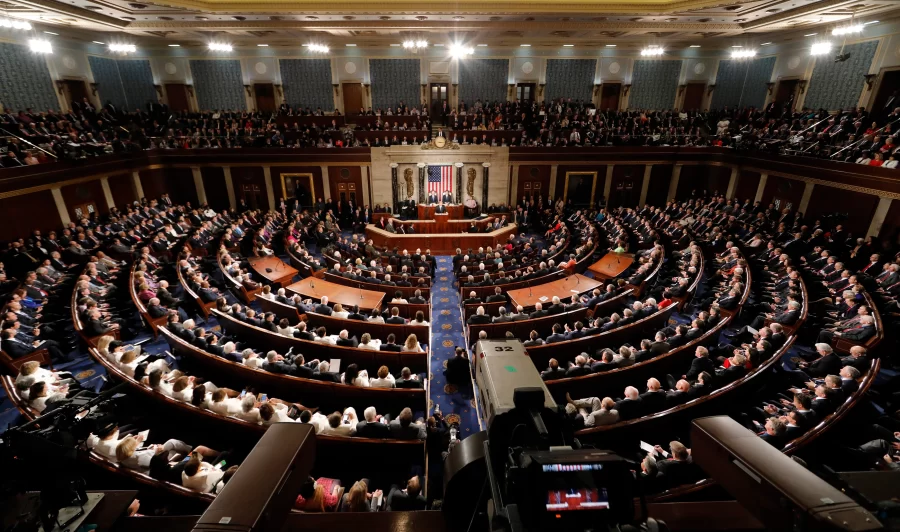Correct Congress
October 24, 2022
Our oldest current serving US congressman at 88 years old is Dianna Feinstein, born June 22, 1933. I would bet that she’s older than most grandparents, and she’s a deciding factor in landmark laws like the Patriot Act and the Affordable Care Act. Would you trust your Grandma to weigh in and make decisions that impact millions of people every day?
The US Congress is a very flawed branch of government in the US that flies under the radar due to the dispersion of power among the many senators and state representatives. However, when you take a deep dive into the U.S. Congress, you see all of its shortcomings of unchecked democracy, with some representatives in Congress being in power for over two decades influencing US policy. Some of them are twice the average age of the district they represent, like California representative Lucille Roybal Allard, 81, and Texas representative Eddie Johnson, 86. Americans need Congressmen who represent the current American, not the American from 30 years ago. This can be fixed with a simple limitation that has worked for the 70 years since we implemented it on the US president, term limits. Term limits are an essential part of a functioning democracy and a vital no-cost answer to the problems plaguing Congress today, including lack of diversity in thought, demographics, and corruption.
One major issue is the lack of representation. The US has a very diverse age range in its population. Baby Boomers (1946-1964), Generation X (1965-1980), Millennials (1981-1996), and Generation Z (1997-2012) are the biggest generations, each generation claiming 22% of the population with the remaining 8% being the Silent generation (1928-1945) and the Greatest
Generation (Pre-1928). With such a wide range of people of different ages, we would assume that there would be a somewhat equal representation of each generation, yet this is not the case. According to an analysis done by the website Quorum.com, of the 540 members of Congress, 304 congressmen were a part of the baby boomer generation making up 54% of Congress. Millennials made up only 5% of Congress with 26 members, even the Silent generation beats them out with 67 members currently serving in Congress. There are twice as many current congressmen born before the end of World War II than there are congressmen who were born after Ronald Reagan came into office.
The average age of the senate representatives is 63 years old, people born in 1959, and the average age of the house representatives is 58 years old, people born in 1964. With this knowledge, we’d think that nearly everyone running for Congress is 50 years old, but this isn’t the case. In fact, in 2020 703 Millennial Candidates were running for Congress, a massive 226% increase compared to the 264 Millennial Candidates in 2018. Despite the massive pool of candidates, many of them don’t get elected, bringing to light a new problem in Congress.
The problem is the perks of incumbency, the way Congressmen can stay elected is through the benefits of running as an incumbent Congressman. As an incumbent Congressman, you automatically have the upper hand, already having experience in office and the qualifications for Congress. When you’re new in the running, you have to prove your qualifications through years of experience where the incumbents don’t need to. Congressmen also have access to staffers, funds, and other bonuses that new challengers don’t have access to like free postage, allocated transportation funds, and vast networks of staffers and resources in Congress. Not to mention, Congressmen make a remarkable salary starting at $174,000 a year With that much personal funds at hand, they don’t have to rely on donations for campaign funding like their
challengers. Incumbents have nearly everything going for them, more campaign money, more resources, more campaign visibility, more merit, and the list goes on and on. Sadly, there is little we can do about the perks of incumbents due to them being necessary with Congressmen needing stipends to subsidize their travels to Washington DC and back to their home state. They need some staffers and federal resources to help deal with multiple municipalities under their representation. We can try to lower a Congressman’s salary through possible legislation, but it will ultimately go through Congress so attempts would be in vain. Although there is little we can do to curb the benefits and resources of Congress, we can better balance the power of Congressmen in the U.S. government through the implementation of term limits. Term limits for Congress encourage the circulation of new ideas and help prevent corruption, all with little to no setbacks.
The introduction of new ideas is a constant of a functioning society; it is through the implementation of new ideas that nations flourish. With term limits in Congress, we would be able to cycle through new candidates and representatives, each with a unique perspective and take on how to run the country. Even if the parties of a certain district or state never change, the implementation of that particular party’s ideology and policy always differs and changes over time. A Teddy Roosevelt Republican is leagues different than a Reagan Republican, and in conjunction, a Johnson Democrat is just as different as an Obama Democrat. With each new election we have a new possible party and a new perspective on that party’s beliefs and all thanks to term limits for cycling out representatives and senators for new ones.
All organizations or bodies of people are or were somewhat corrupt, there is no exception from the Chambers in the Capitol building to the halls of the Vatican. Yet, nearly every organization attempts to hinder any corruption to the best of its ability, adding term limits would
be another check to keep Congress from abusing its power. Congressmen are assigned to committees that oversee certain niche aspects of governance that require extra oversight like agriculture, the budget, transportation, and more. However, with these committees comes new knowledge of future legislation and regulations in some of these industries. Normally this wouldn’t matter for any of the Congressmen if they had no business in these industries but, Congress doesn’t have any current restrictions on buying and trading stock. This has led to speculation and even conviction of current Congressmen for insider trading, the most notable example being former New York representative Chris Collins who was sentenced to 26 months in jail. Although term limits aren’t a direct solution to insider trading and other forms of corruption, term limits will decrease insider trading due to the constantly changing cycle of moral congressmen. With less time in these committees to influence policy the less insider trading, there will be due to the short terms of Congress before they can reap the rewards of long-term stock trading.
In summary, term limits are a no-cost reform for Congress that will diversify Congress demographically and ideologically while helping to discourage corrupt insider trading. Term limits don’t require any money to upkeep and are a net positive helping shape American society and government for the better. After all, if the Presidency needs term limits to prevent it from getting too powerful, so does Congress. Advocate for term limits today.
Work Cited
Hedtler-Gaudette, Dylan, and Walter M. Shaub. “American Voters Say Corruption Is a Concern; Congress Should Heed the Message.” Project On Government Oversight, 8 Nov.
2021,
https://www.pogo.org/analysis/2021/11/american-voters-say-corruption-is-a-concern-congr ess-should-heed-the-message.
“How Old Is Congress?” Quorum, 12 Aug. 2022,
https://www.quorum.us/data-driven-insights/the-current-congress-is-among-the-oldest-in-history/.
“Millennials on the Rise in Congress.” Millennial Action Project, 2020, https://www.millennialaction.org/millennials-on-the-rise.
“Sitting Members of Congress and Incumbents Are Almost Always Reelected.” Initiatives v Oligarchy, 27 Sept. 2019,
https://cusdi.org/faq/why-are-sitting-members-of-congress-almost-always-reelected/.

























